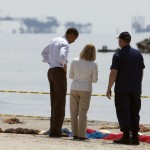Lessons from the Spill
 For months, Americans watched oil spill into the Gulf, while experts and technocrats assured us they were doing everything they could to stop the disaster.
For months, Americans watched oil spill into the Gulf, while experts and technocrats assured us they were doing everything they could to stop the disaster.
Many years ago, I was accompanying my boss, then-first term Democratic Representative Norman Y. Mineta, on a series of visits with constituents of his Silicon Valley district. One of our meetings was with the leadership team of an advanced nuclear engineering company (General Electric’s nuclear power headquarters were in San Jose, and the company we were visiting did a great deal of design work for GE). It was in the spring of 1976 and a major topic of conversation was the upcoming vote on Proposition 15, a measure aimed at curbing the development of nuclear power plants in California.
The engineers we were meeting with were all terribly bright and eager conversationalists. And on that day several were quite agitated by Prop. 15, and its potential impact on them and their industry (voters must have shared some of their concerns, as the measure went down to a resounding defeat that June). But I remember one fellow in particular who was particularly upset and exasperated; he said something like “Why don’t the people and politicians just stay out of our business? We know what we’re doing and they don’t!”
I have thought a lot about that meeting ever since we learned that BP’s deep water oil well in the Gulf of Mexico had blown-up. Thankfully the leak has now been plugged and further environmental degradation is unlikely. However for three months we watched an estimated 200 million gallons of oil spill into the azure waters off of our southeastern coast; throughout the period we were told that one after another remedy was being tried, one more technological “fix” was on its way. The experts and technocrats assured us that they were doing everything they could to stop the disaster and undo its damage.
And while I don’t know any of the BP folks involved, I am assuming that they are just as bright and just as able as was that engineer in Los Gatos 34 years ago. I am also guessing that many of them, and certainly several of their superiors, have felt and uttered sentiments similar to his, both before the explosion and since. And they, together with at least one politician/apologist, are just as wrong as he was.
Over the years since that 1976 meeting with the nuclear engineers, I have worked extensively with that industry at both the state and federal levels. I have also advocated on behalf of companies and associations that drill for and transport oil, manufacture automobiles, fly airplanes, own and operate casinos, develop real estate, and develop weapons systems. I have also worked with and for educators, health care providers, farmers, pilots and flight attendants, and “good government” groups. I believe everyone has a right to be represented in the public policy making business; it is a cornerstone of our system of representative government. I also believe that, as a rule, most people, companies and organizations that seek and utilize such representation are honest and well-meaning.
But they are not always right. And it is government’s responsibility to make sure that when they are wrong the people’s interests are protected. The Deepwater Horizon disaster is proof positive that the people and their elected representatives simply cannot “stay out of [their] business”. To do so would be irresponsible and, as we’ve seen, dangerously wrong.
And this is where and how the debate should be framed: How can the legitimate yet competing interests of both industry and the public be furthered and protected?
We must insist that the ensuing public conversation center on questions such as: What is the legitimate role of government in ensuring the health and safety of its constituents and of our natural environment? How can government and industry best work together to prevent catastrophes? Or can they? How can people of intelligence and good will, be they oil company employees or government regulators, find common ground?
So far the prospects for such a conversation seem bleak, however. Grandstanding politicians outnumber the reasonable ones by a significant margin (although it is important to note that both President Barack Obama and Mississippi’s Republican Governor Haley Barbour actually tried to be very constructive in this regard). Televised hotheads from both right and left spouted off nightly throughout the crisis went on, but seldom did the heat they generated shed any real light on either the problem or its possible remedies.
The stakes in the wake of Gulf of Mexico disaster are enormous---they probably couldn’t be higher. Let’s demand that the politicians on both sides of the aisle treat it---and us---with the level of respect and seriousness that the circumstances warrant.